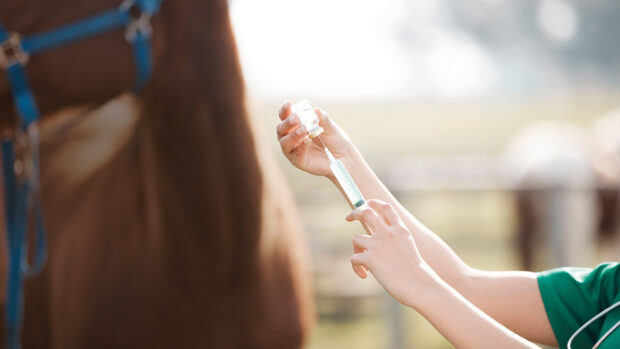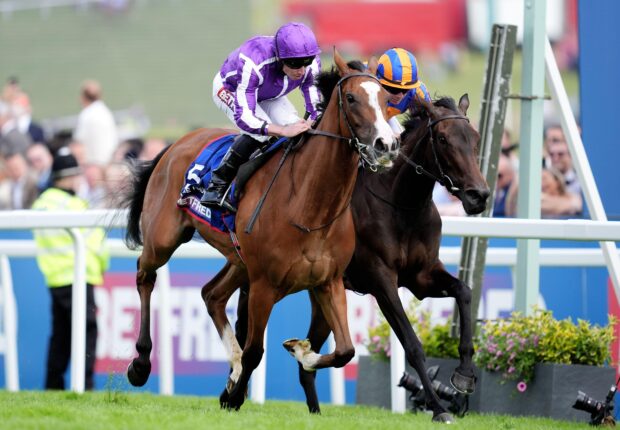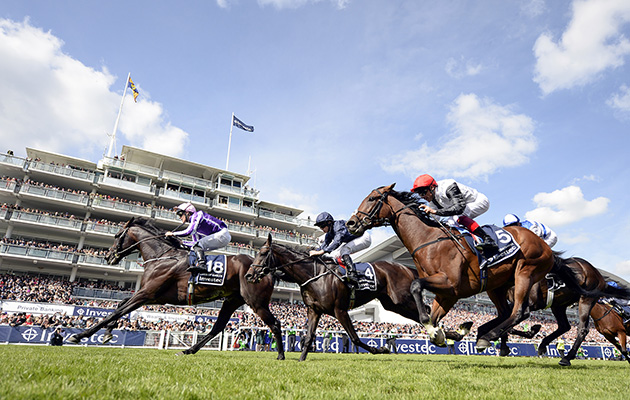An Investec Derby Festival-winning horse has been stripped of his victory after testing positive for a human painkiller.
De Bruyne Horse, trained by Richard Hannon, was disqualified from the Investec Woodcote Stakes at Epsom (2 June 2017) after banned substance O-desmethyltramadol, a metabolite of Class B drug tramadol, was found in his system.
The British Horseracing Authority’s (BHA) disciplinary panel disqualified the horse from the race and fined Mr Hannon £8,000 in an enquiry on 30 November.
This is the fourth time in two years a horse trained by Mr Hannon had tested positive for this drug.
In May 2016, Mr Hannon was fined £2,000 following positive tests for tramadol at Ascot on 10 July 2015 and Goodwood on 23 September 2015.
A second enquiry was held on 9 June 2017 relating to a horse named Logout Island in a race at Newbury on 14 May 2016 and Mr Hannon was fined £5,000. In both cases the panel said they could not be satisfied the administration of the substance was accidental.
In the case of De Bruyne Horse, the colt was tested at Epsom and returned a positive result. Mr Hannon asked for the B sample to be analysed, which “produced a similar result”.
On 19 June BHA investigating officer Tim Miller and anti-doping manager Tessa Muir visited Mr Hannon’s yard and took a urine sample from the horse, which tested negative for the substance.
The staff at Mr Hannon’s yard were questioned, but none said they were taking tramadol as either a prescription drug or recreationally.
Mr Miller returned to the yard on 5 July and asked anyone with information to speak to Mr Hannon or himself.
Nobody came forward and Mr Hannon was interviewed “at length” but could not explain how the drug had come to be in the colt’s system.
Mr Miller inspected veterinary records, contacted farriers, vets and other service providers, viewed CCTV of the stables at Epsom and found “nothing adverse”.
He also requested clinical history of all the dogs on the yard, however these were not provided. Mr Hannon chased it up and two were provided and forwarded to the BHA.
Mr Hannon added he had sent a written message to all staff on 8 June 2016 requesting they log any medication that they are on with the office.
He also reminded them that urinating in stables is forbidden; introduced a “personal medication policy” to reduce the risk of cross-contamination plus drug and alcohol testing for new starters and installed hand sanitizers around the yard.
On 5 July 2017, he also asked an independent vet to collect blood samples from 20 random horses and test them for tramadol, which was repeated two weeks later. All samples returned negative tests.
The BHA stated it was unable to find the source of the positive test.
In his defence, Mr Hannon said he had spent a lot of time and money trying to improve the situation.
He said after the May 2016 test on Logout Island he had not known what additional steps to take, but since the most recent test, he had taken outside advice as to how the stable’s practices could be improved.
He added another major change is he has introduced a system of elective testing, where an independent vet tests random samples from 10 horses on a regular basis.
The panel decided it was “satisfied the tramadol was not administered intentionally by Mr Hannon or by any other person for whom he is responsible”.
However, they found despite his recent policies and changes to prevent contamination, these did not come early enough to be applied to the most recent test, and ruled that he did not exercise “all reasonable care”.
Article continues below…
You might also be interested in:
‘We’re proud of every film we produce and to have these accolades is really special for everybody’
The former top footballer donned silks and breeches to take part in the race at Ascot in aid of the

Wins for Many Clouds and Emma Massingale at New York film awards

Michael Owen finishes second in his first charity race
“We acknowledge that Mr Hannon operates a successful business with a large number of horses and that he operates from two different yards,” said a statement from the BHA panel.
“Nevertheless, this fourth finding is a cause for serious concern in that apart from the documents issued to his staff in July 2016 no serious attempt to improve the system was implemented until after the fourth positive on 2 June 2017.
“For that reason the panel’s view was that, absent of other factors, the appropriate penalty would be at the top end of the range.
“The panel were, however, impressed by Mr Hannon’s candour in relation to the past and in particular his acknowledgement that following the test on 2 June 2017 he realised that he had to take outside advice with a view to improving the position.
“In effect he had a proper risk assessment carried out. As a result he has installed the clock-in system and hand sanitizers and has also introduced the system of elective testing carried out by independent veterinary surgeons.
“The Panel’s view is that Mr Hannon should be given credit for this and as a result the penalty will be a fine of £8,000.”
Card Sharp has been promoted to first place and the panel also ruled any prize money paid out in relation to De Bruyne Horse’s win be returned.
For all the latest news analysis, competition reports, interviews, features and much more, don’t miss Horse & Hound magazine, on sale every Thursday




